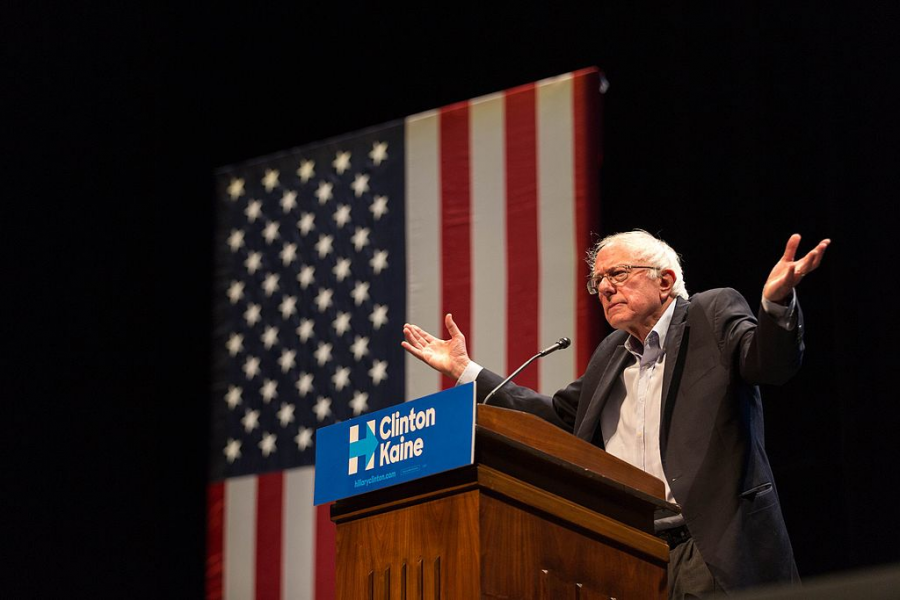The nightmare that is the 2020 presidential primaries seems to finally be over, with former Vice President Joe Biden having emerged as the presumptive Democratic nominee after Senator Bernie Sanders suspended his campaign on April 8th. Sanders endorsed Biden five days later.
Sanders’ exit from the race came after a string of losses in states he won in his 2016 presidential bid. Biden’s unexpected surge proved the strength of the Democratic establishment and showed he could win despite President Obama’s nonintervention. For a more detailed analysis of how Biden’s momentum started, read this well-written article.
Sen. Sanders first burst onto the national scene when he emerged as the surprise challenger to Hillary Clinton’s 2016 Presidential bid, and as the first admitted socialist to gain a national following since Eugene V. Debs a century earlier. Voters were drawn by Sanders’ consistent record, his willingness to criticize the establishment and economic status quo, and, perhaps most importantly, that he was not Hillary Clinton. Sanders won 43% of the vote in 2016 and established himself as one of the frontrunners for 2020 after Clinton’s eventual defeat.
Four years later, Sanders was poised to cruise to the nomination. He had won the popular vote in the first three state contests, and articles like this one were everywhere. Unfortunately for Sanders, they proved to be cold takes. Biden amassed crucial endorsements from former rivals and local representatives, helping him steamroll the rest of the field, then finish off Sanders a few weeks later.
Had “Joementum” not checked Sanders’ own surge, Bernie likely would have either won the nomination outright or taken a plurality of delegates, which would have placed him in a position of strength at a brokered convention.
All things considered, Sanders still could have won. Biden’s verbal gaffes have been well-publicized, and Bernie was still virtually tied with Biden nationally after the South Carolina primary.
There are three main reasons for Sanders’ collapse. He failed to expand on or even retain his 2016 support, his campaign was not as strong as its core support and early success made it appear to be, he was hurt by events he could not control like the Iowa Caucus disaster and the establishment rally around Biden, and
Bernie’s rallies were famous for their crowds. The enthusiasm of his supporters was well known and was the main reason why he performed so well in the early caucuses, which required much greater time and energy commitment compared to in-person voting. Other than the die-hard supporters, though, there weren’t many other converts.
Sanders, perhaps buoyed either by the strength his campaign projected or motivated by his own convictions, made virtually no ideological concessions to the party he refused to join. This hurt his standing with older and non-socialist voters, and so Sanders had trouble capitalizing on the exits of Warren, Buttigieg, and Steyer once he lost the lead.
Sanders’ support actually shrank after 2016, and for several reasons. The abnormally large Democratic field split his support early, but after Super Tuesday, it was once again a two-person race. The reason for the shrunken support is relatively simple: Joe Biden and Hillary Clinton are fundamentally different candidates.
Secretary Clinton was one of the most unpopular nominees in history and had much more political baggage than Biden despite having comparable levels of experience. Without the anti-Clinton motive, fewer people felt the need to vote for Sanders, which proved crucial in states like Michigan.* Biden was also, of course, Obama’s running mate, which led to outstanding support from African-Americans throughout the primary.
Sanders was also unable to build enough momentum to check Biden in his firewall state of South Carolina. This was primarily due to the Iowa Caucus fiasco, which did not reveal Sanders as the popular vote winner here until long after it mattered. Had it been a normal caucus, Sanders still wouldn’t have been able to generate the momentum needed to win the nomination. In our world, it certainly didn’t help him moving forward.
The randomness of the primary has caused some die-hard “Bernie Bros” to vaguely allege that the primaries were somehow skewed against Sanders by the Democratic Party itself, using the widespread endorsements of Biden as an example. Party meddling may have happened in 2016, but the argument makes absolutely no sense in 2020.
Candidates, unsurprisingly, endorse people they both generally agree with and think will win. Biden was both on Super Tuesday, in sharp contrast to Sanders. Bernie had failed to be anything but ideologically rigid, and was now behind in polling. Biden earned his votes, they weren’t predetermined for him. Election fraud experts agree: There has been no foul play so far in 2020.
The facts make it clear: America rejected Bernie, no matter how earnestly Twitter argues to the contrary. And frankly, this is a good thing for everyone.
For conservatives, this is easy. Despite any electoral advantage Sanders might or might not bring to the Trump 2020 effort, his defeat prevents the official legitimization of American socialism. Though Biden will adopt some of Bernie’s policies, America will not see Medicare for All for a few years, no matter who wins in November. Those concerned about the budget (and they have been very quiet during the spending boom of Trump’s Presidency) can breathe a sigh of relief.
Democrats, who I distinguish here from progressives due to the nature of the Democratic Party, now have a much greater chance at victory. Biden has a much better chance at winning the votes of disaffected conservatives than Sanders did, and would also be better poised to swing key Senate votes in what will likely remain a Republican majority.
And for progressives, Sanders’ failure has a silver lining. His relatively early exit means less strife at the Convention and more chance for a peaceful reconciliation between the progressive and mainstream wings of the Democratic Party. What’s more, they can focus more of their energies on getting House and Senate progressives elected to grow their movement nationally regardless of who is in the White House.
All policies aside, however, it is good for America, political discourse, and democracy that Sanders was defeated. Despite progressive claims, Sanders is not a cure to Trumpism. He and Trump are actually remarkably similar in the way they articulated and weaponized public resentment and previously radical political theory.
Sanders and Trump both represent movements that have been simmering for decades. As each party establishment grew out of touch with its members, distrust grew. There were earlier iterations of the two in Howard Dean’s and Newt Gingrich’s candidacies, but the frustration reached a boiling point in 2016. Both candidates built their image around rejecting the status quo: Bernie called for economic revolution, Trump rages against the cultural elite. An Us vs. Them tribalism dominates what little remains of the progressive and Trumpian intellectual movements.
The two populists’ dual ascendance shows just how polarized American politics have become since general discontent started to build in the mid-1990s. Having two angry old partisans at the top of their tickets means meaningful discussion between the parties would have broken down even further, creating national security issues, among other things. Even today, Congress’ rare urgency over COVID-19 aid breaks down over partisan squabbles, personal favors, and political tricks, generating more discontent with the entire electoral system.
Polarization also makes us more vulnerable to human threats. Russian election interference, which has tried to benefit both Trump and Sanders because of each’s controversy, works because it exploits partisan fears and anger. The goal of foreign interference is not to advance a singular ideology, but to advance distrust and partisanship. As our nation’s trust in information, truth, and each other weaken, we begin to lose a sense of who we should be as a country: A nation of freedom, democracy, of liberty and justice for all.
For the Russian government, this means a weakened geopolitical rival. For America, it means we risk losing the principles that define us as the leader of the free world.
This election will probably be determined based on how seriously COVID-19 affects the American people and the economy. But much more is at stake in this critical historical moment. 2020 will determine our nation’s character and identity, and what the new political normal will be once the septuagenarians of each party are no longer relevant.
Bernie Sanders, though well-meaning to a fault, elicits the same visceral reaction from the right that Trump gets from the left, perhaps due to their equally toxic online supporters. His election would make permanent the lack of focus and hatred that has corrupted American politics since Newt Gingrich targeted bipartisanship as a weakness. Even his nomination would demonstrate that the Russians have already won in their campaign to radicalize the major parties and that America would be condemned to watch the two parties erase each others’ policies indefinitely.
The 2020 election has more than just healthcare reform or ideological clashes at stake. It will decide whether our country steps toward civility or resentment, and who will lead us into a better tomorrow. That question is yet to be answered, but we still know one thing: America still has a chance.
*For a more in-depth analysis of Sanders’ demographic struggles in Michigan and everywhere else, read this article from Politico.









